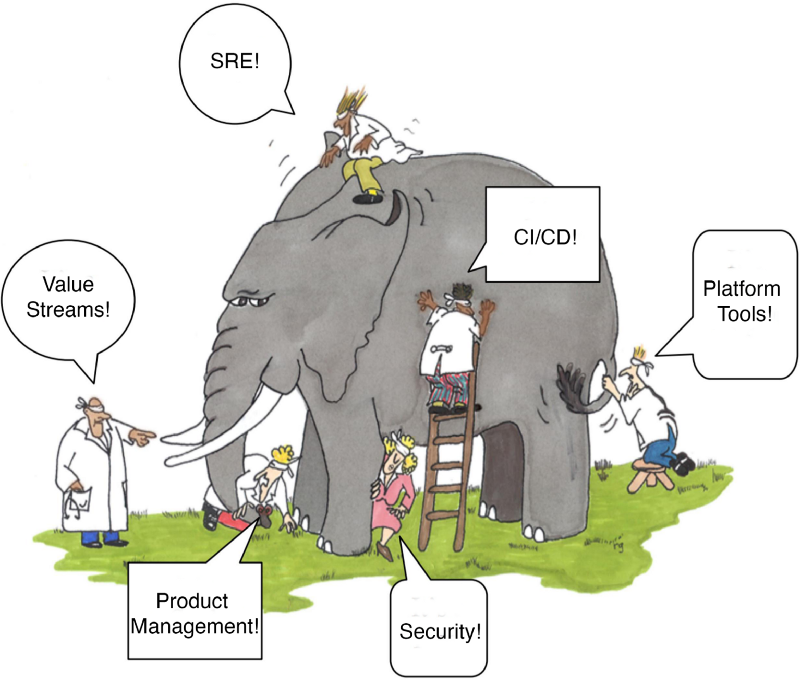DevOps or SRE?
4 minute read
A few years ago, one of my friends took a new role and talked about the work we’d been doing on DevOps. His new CTO said, “DevOps is dead! It’s all about SRE now!” Someone is missing the point.

I had dinner recently with Patrick DuBois, who coined “DevOps”, and Andrew Clay Shafer, the “Godfather of DevOps” and we talked about some of the industry challenges, the glacially slow progress toward improvement, and the frequent setbacks we are seeing. There are many reasons for it but much of it comes from people not approaching it with systems thinking. Instead, terms get misused, packaged, and sold. For successful improvement, we need to view the whole system.
I really like Donovan Brown’s definition of DevOps,
“DevOps is the union of people, process, and products to enable continuous delivery of value to our end users”
Simple and direct and makes it clear that we need to address the entire system. In the interest of brevity, let’s look at where some of these pieces fall in the system. The following are some of the major topics. It is in no way exhaustive.
 The DevOps Elephant
The DevOps Elephant
Product Management
The whole point is to improve how we deliver products. Product management needs to be on the ball. We cannot assume what we build will be valuable. We need to do our research, make value hypotheses, and find ways to get feedback as quickly as possible on small value experiments. Every delivery is a wager on value vs. wasted effort and larger deliveries are more expensive when we lose the bet. Smaller is always better when trying to invent something new that we hope is valuable.
Value Streams
This is how we organize teams, not just development. Do we have functional silos? How many handoffs or communication paths are required to deliver something? Every handoff adds wait time where work sits idle until it can be picked up by the next person in line. Where are the bottlenecks that are slowing things down? Analyzing those problems and reorganizing things makes it much less costly to deliver value.
Security
“Introducing DevSecOps!”
If we are working to continuously deliver value to the end user, is it valuable if it’s insecure? Security has always been part of DevOps. It’s not a new discipline. We need to be “secure by design” in DevOps instead of the classical Grenade Driven Development approach of building the system and then attempting to secure it with inspection at the end. Security should be a platform that enables secure delivery with tooling and training, not police investigating the “crime of new software.”
Platform and Infrastructure
Our DevOps team is responsible for the configuration of over 300 pipelines!
DevOps isn’t a team or a job. See the above definition. Platform and Infrastructure teams are also enablers of value delivery and should be working to provide self-service solutions that are easy to use so that development teams do not need to know how they work, they just work. Without this, value delivery suffers.
Continuous Delivery
It’s right there in the definition, “continuous delivery of value”. It’s even the very first principle of the Agile Manifesto. CD is not tooling. CD uses tooling to enable a workflow that focuses on a repeatable quality process that can reliably give us feedback on known quality issues before we deliver to the end-user and uncover unforeseen quality issues. This workflow focuses on improving things to enable ever smaller deliveries to accelerate feedback loops from production. It’s not a “throw it over the wall” delivery approach. It’s a quality initiative that enables us to respond quickly to functional, performance, security, or any other quality issue. It also allows the small batch sizes that enable smaller value experiments that reduce the risk and size of lost bets.
SRE
We don’t have DevOps, we have SREs!

Again, DevOps isn’t a job. DevOps is the whole operating model for improving value delivery. Delivery teams need air cover to ensure they are able to focus on their quality process and are not pressured by deadlines to deliver unstable or unusable features. A Site Reliability Organization or similar capability that has the independence to say, “until you are stable, we a returning operational monitoring responsibility to you” is important quality backpressure to prevent things from coming off the rails in the quest for speed. We need smaller, sooner, and more stable. If it’s not stable, it’s not valuable.
Let History Guide Us
If you’d like to learn a bit more about how DevOps started and what the goals are, I suggest looking at what was written by the people who were there at the start. Damon Edwards is one. Check out his recollections.

